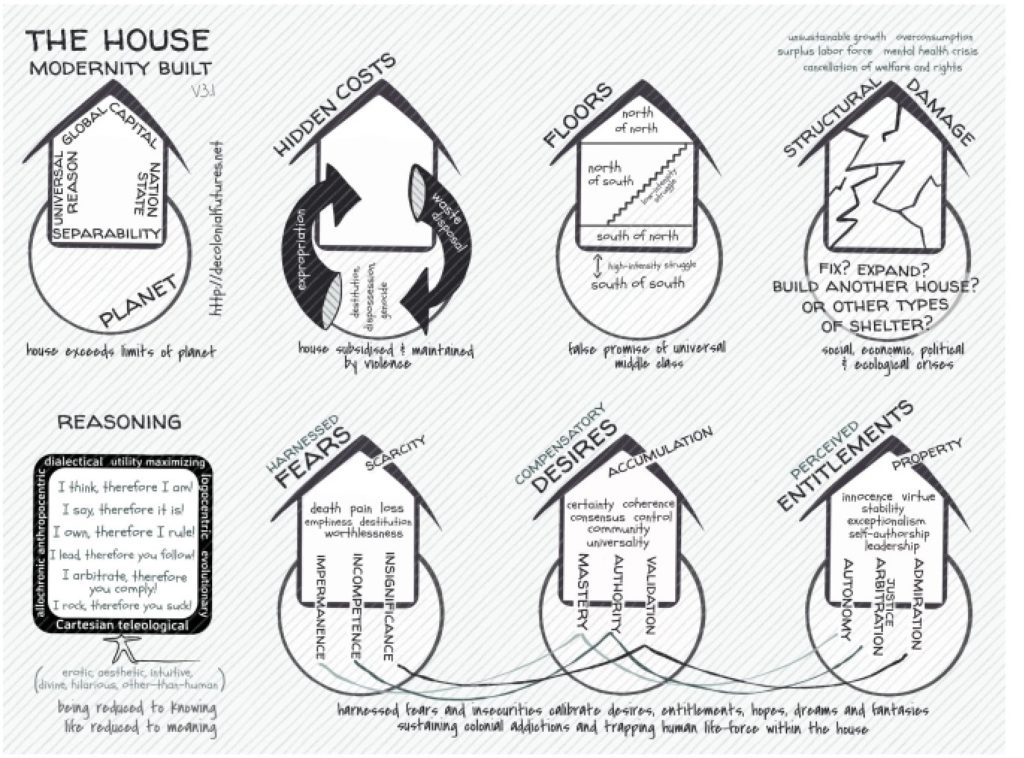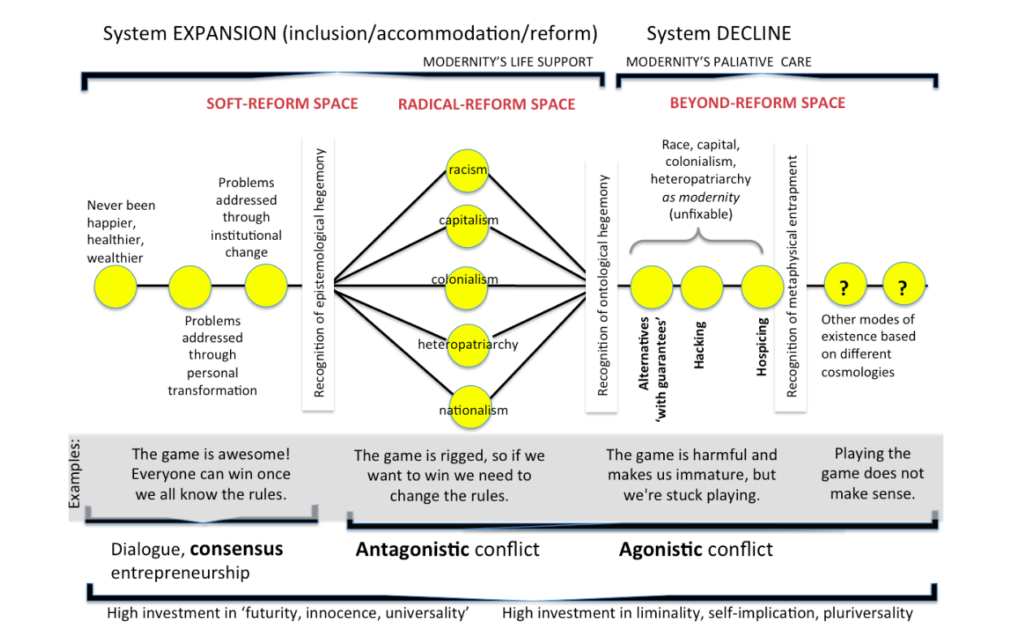Hospicing Modernity: Facing Humanity’s Wrongs and the Implications for Social Activism is a challenging book and the author, Vanessa Andreotti, wants you to make sure that you are ready to receive its lessons. It’s not challenging because it uses academic vocabulary or requires you to have already read a lot of books, but because its stories and exercises will force you to make an honest accounting of your attachments to modernity/colonialism (a term the author uses to show the inseparability of violence and unsustainability from the project of modernity). This will be especially challenging for people who are ideologically wedded to seeing capitalism as the primary driver of our current predicament (economic, political, social, environmental, etc.) or who have become skilled at not seeing the externalities embedded in our modern comforts.
Modernity/coloniality imposes a mode of representation that claims both benevolence and universality for itself, while denying its violence and unsustainability.
Hospicing Modernity, page 19
The book’s title alone is confrontational: Hospicing Modernity. Hospice care is not rehabilitative – it’s palliative. A patient entering hospice care is not seeking to be cured, but to be comforted and cared for at the end of their life. Hospicing is about accepting the inevitability of death with compassion and dignity, recognizing our shared mortality and biological limits as humans. To declare that we are hospicing modernity is to say that we recognize that modernity is dying and that the time has come to stop resisting its death so that we can mourn and focus our energy on nurturing what comes next.
“Modernity” is often used in the same context as “civilization” and “progress”. “Modern plumbing”, “modern medicine”, and “modern warfare” all imply a linear march away from backbreaking labor and unsophisticated technologies, towards something better. Modernity brought longer lifespans, space travel, running water, the internet, liberal democracy, highways, dentistry, unlimited consumer choice, vaccines, and pretty much every other comfort and convenience we take for granted in our daily lives.
Why would anyone want to give all of that up??
That question had been a sticking point for me for a long time. Liberals and conservatives alike are quick to remind us that life was “nasty, brutish, and short” before modernity, casting any mention of systemic change as a barrier to progress and a burden on taxpayers. No matter how costly the “externalities” – colonialism, the Transatlantic Slave Trade, genocides, apartheid, proletarianization, extraction, industrialized wars, pollution, climate change, economic collapse, fascism – the rewards of modernity are always greater because we hold them in our hands and have become acclimated to them. I love coffee and electric heat and imported veggies and buying books and travel and…
…watching a genocide unfold on the little screen I hold in my hands.
I knew a lot of facts and statistics about colonial genocides before this handheld genocide, but I protected my heart from knowing the true violence of it all. Now I have seen many human parts in bags, pools of blood and shredded skin, entire bloodlines wiped out, faces contorted from months of torture, stray limbs, the destruction of archives and schools, piles of bodies, bones left picked and uncounted, humiliation, starvation and the joyful eyes of settler soldiers celebrating – and the denial of it all by upstanding “good” people. I am not the same person I was ten months ago.
The shift I’ve experienced since October 7, 2023 is not one of seeing Israel as uniquely evil – although I am now far more versed in the particular evils of Zionism as a fascist expansionist ideology claiming to have god’s approval. No, growth has come from recognizing the horrific violence that modernity has required all along and continues to require. Violence that is intentionally hidden away in the data, maps, and nationalistic mythology. Palestine has overwhelmed my defenses and made me vulnerable in new ways, enfleshing Manifest Destiny’s statistics and revealing Empire’s modern clothes.

Meanwhile, every day is the hottest and data centers must be built. The minerals must be extracted and the weapons must be manufactured. The richest 1% must create 66% of emissions and they must take 2/3 of all profits. The costs of floods, droughts, tornadoes and wildfires must be socialized. The Congo must surrender its minerals. The Amazon must be slashed and burned. The social safety nets must be shredded and the homeless must be criminalized and the police must be militarized. Hospicing Modernity invites the reader to become disillusioned with all these inevitabilities and false solutions and to see them for what they really are: symptoms of modernity’s collapse, to be moved through rather than grasped as apocalyptic omens.

As an education researcher and scholar concerned with decolonization, Vanessa Andreotti patiently spends the first part of the book bringing readers up to speed on vocabulary and provides important context for understanding. The first chapter is a thought experiment that places the reader in the year 2048, in conversation with people from around the world who are reflecting on the previous forty years and the various human-caused catastrophes that occurred – climate change, war, species extinction, etc. It is dark, but as I mentioned in the beginning, Andreotti wants the reader to be prepared before moving onto the more challenging materials.
The thought exercise asks the reader to observe with open eyes all the things that currently keep us up at night, imagining that in the years leading up to 2048 humanity woke up and realized their interconnectivity with each other and a living Earth. How would the people in 2048 teach about what had happened? What event compelled people to finally come together? This is not mere hopium – many parts of the natural world are dead and millions of humans have died by 2048 – but openness to the possibility that more people will wake up as they become personally affected in a more significant way. As someone who tends towards depression and apocalyptic thinking, I found this exercise to be so helpful for neutralizing a lot of the fear that has made thinking about possible futures impossible.
Andreotti unpacks modernity and colonialism in the next chapter, not in an attempt to create a grand narrative or historical overview, but to help the reader bring attention to patterns of thought and behavior that reproduce colonial relationships of extraction and exploitation in the present. This chapter is really about reflecting on our own habits of denial and narcissism that are barriers to establishing relationships of accountability and reciprocity. Why Read (or Not) This Book is the next chapter, which inoculates the reader to some discomfort they might experience from engaging with the book, encouraging maturity, courage, and fortitude through it. Andreotti’s style reminds me of some of the martial arts coaches I learned the most from. She doesn’t sugar-coat the reality that learning will take a great deal of humility and effort, but she also doesn’t act as a gatekeeper to esoteric knowledge.
The final chapter of the first part, The Most Important Chapter, offers seven tools that I know I will be coming back to over and over again:
Some of the tools used in this chapter will be used in other chapters’ exercises. Some will support you in creating conditions to hold space for difficulty and discomfort. Others will help you recalibrate your expectations of what this book can do for you. The frameworks and images will also invite you to explore different reasons why our formal education and socialization within modernity do not equip us well to hold space for complexity, uncertainty, ambiguity, paradoxes, and failure. (pg. 42)
One powerful nugget from this chapter came from the third tool, The Bus Within Us. If you identify with being an over-thinker or over-feeler, you probably spend a lot of time ruminating and trying to give meaning to the various emotions that arise. At this point most of us are dealing with some kind of mental illness, trauma, or neurodiversity that can make our emotions feel REALLY BIG. As part of this exercise, Andreotti interrupts the habit of labeling these emotions, using the phrase “affective responses” instead so as to simultaneously get rid of the moral and abstract baggage we often assign to our emotions while making space for their neurobiological reality – which is far more complex than the definitions and vocabulary we use to box them up. She then gives some suggestions for interpreting these “affective responses” so that we can gently notice and sit with them rather than reacting to them.
I am going to end here, but I will return to Hospicing Modernity in the future because this is the kind of book that really sticks to your guts. If you are inspired to dig into this book yourself, I’ve provided some links to buy, borrow, and access free chapters, along with a couple other relevant resources.

You can download the second prep chapter, Why Read (or Not) This Book, and Chapter 9, There is No Away, for free here. You can access the preface and most of the first part of the book (the prep work) on Google books. You can find Hospicing Modernity (both print and ebook) at your local library (via World Cat). There is also an audio version available at Audible or wherever you get your audio books. And you can of course support your local independent bookstore in person or via Bookshop.org.
Vanessa Andreotti and her team also collaborate on a project called Gesturing Towards Decolonial Futures, which “is an arts/research collective that uses this website as a workspace for collaborations around different kinds of artistic, pedagogical, cartographic, and relational experiments that aim to identify and de-activate colonial habits of being, and to gesture towards the possibility of decolonial futures.” Vanessa’s 2015 paper, Mapping interpretations of decolonization in the context of higher education and SO MANY other incredible resources for people curious about popular education for deconstructing our colonial worldview, as well as some of the books exercises like this one on human exceptionalism and the one from the beginning about imagining 2048.
Additionally, check out an interview with Vanessa on The Great Simplification podcast and another with the Post Carbon Institute, titled What Could Possibly Go Right?

Comments
One response to “Hospicing Modernity”
Greetings! I found this blog post to be incredibly informative and well-written. Your ability to break down complex topics into easy-to-understand language is truly a gift. Thank you for sharing your knowledge with us. I’m excited to read more of your posts in the future!